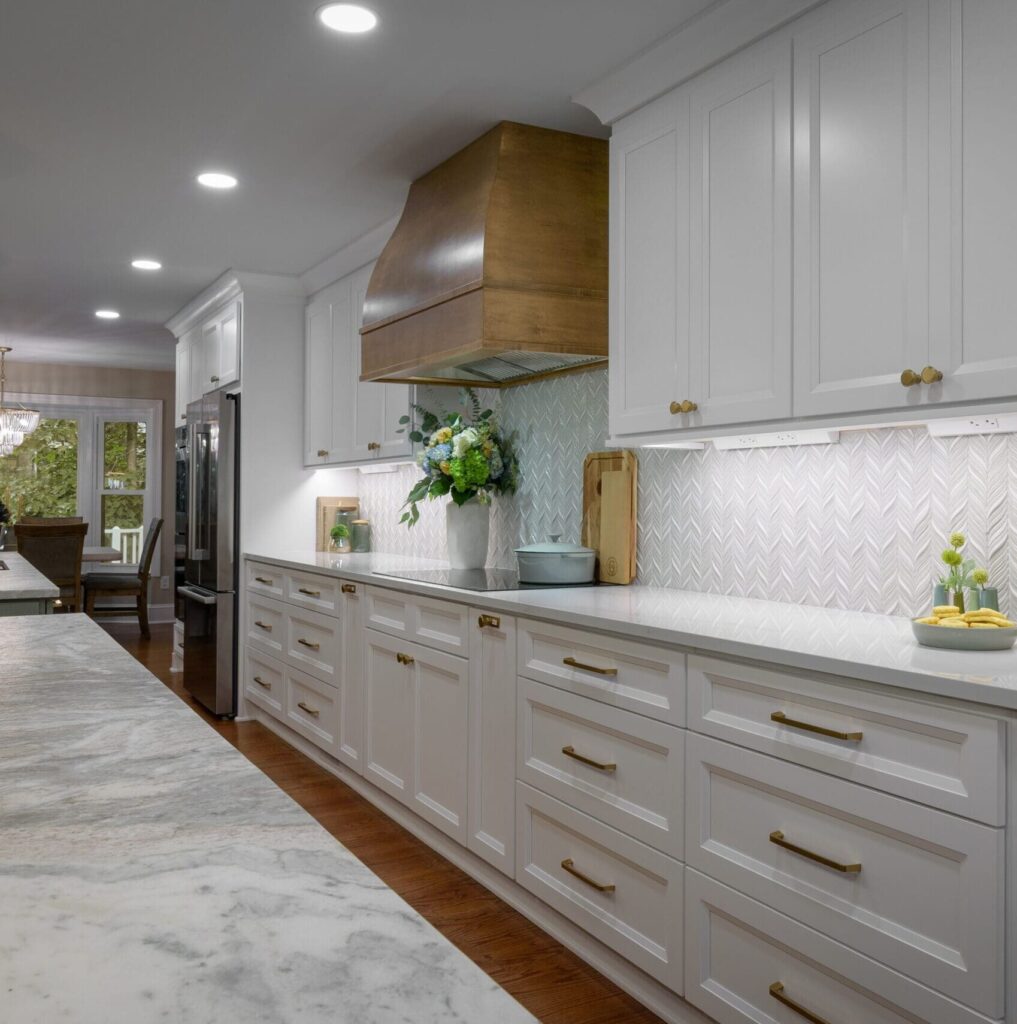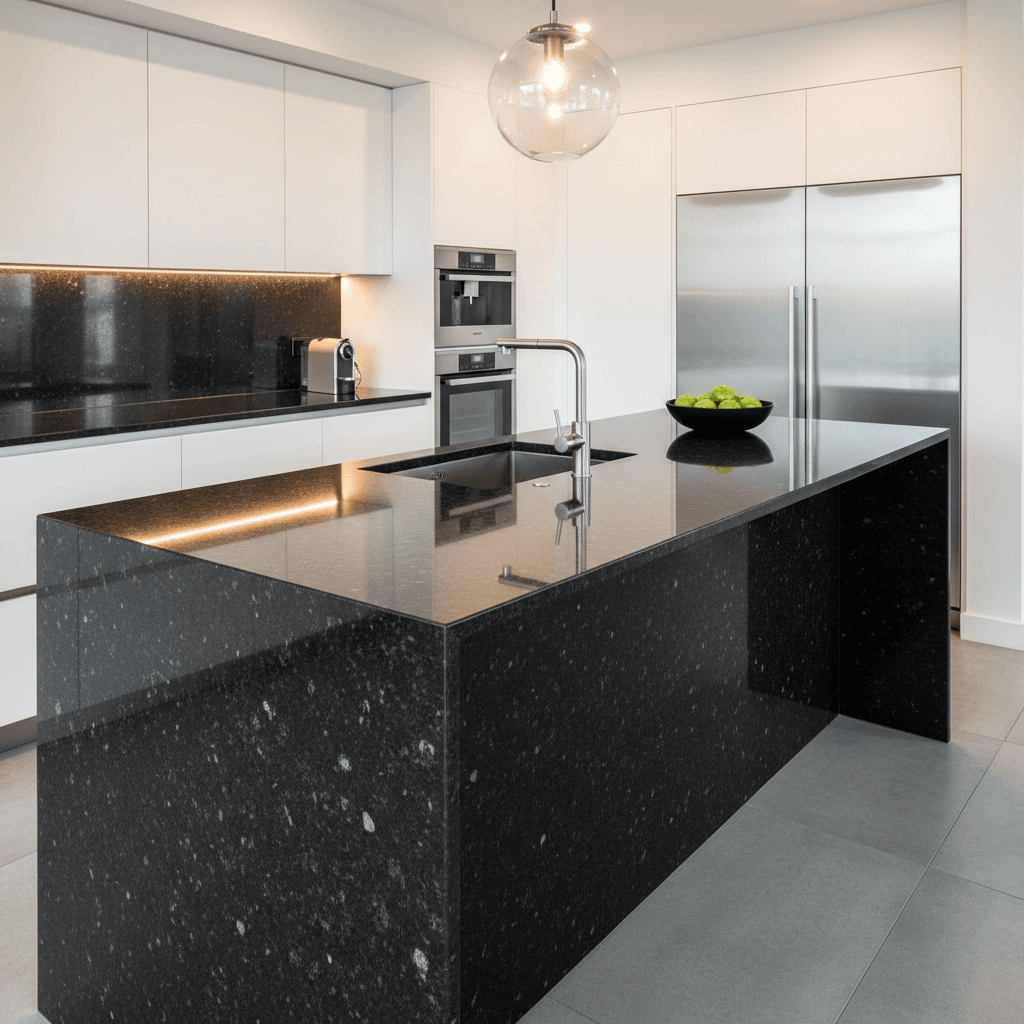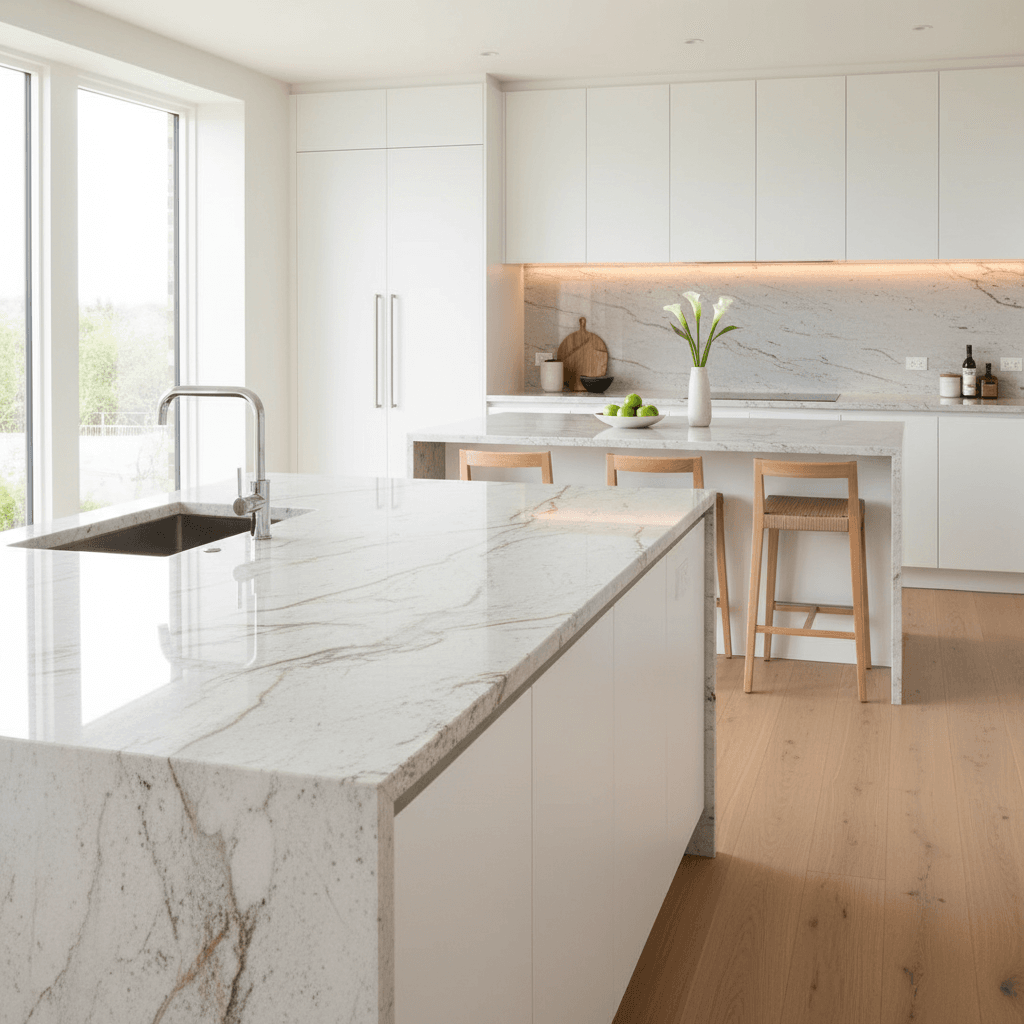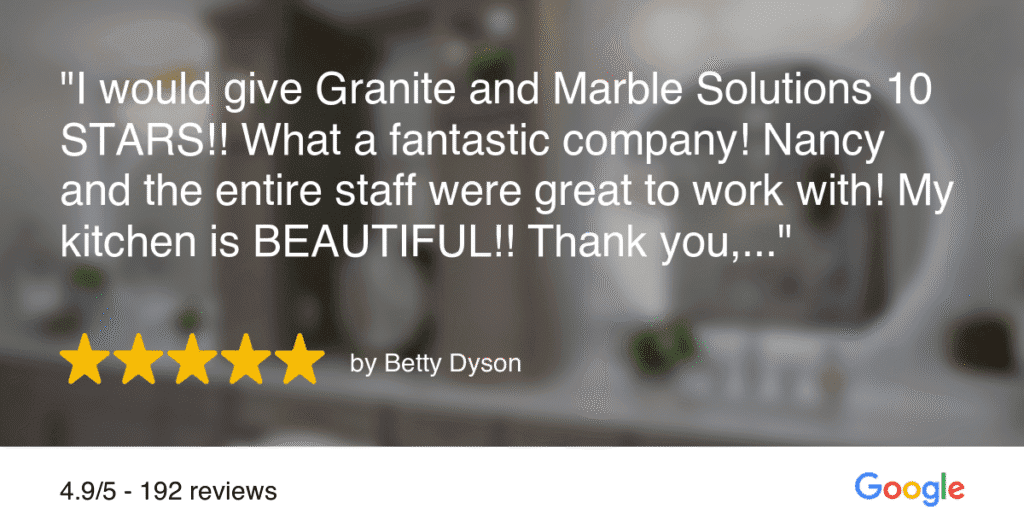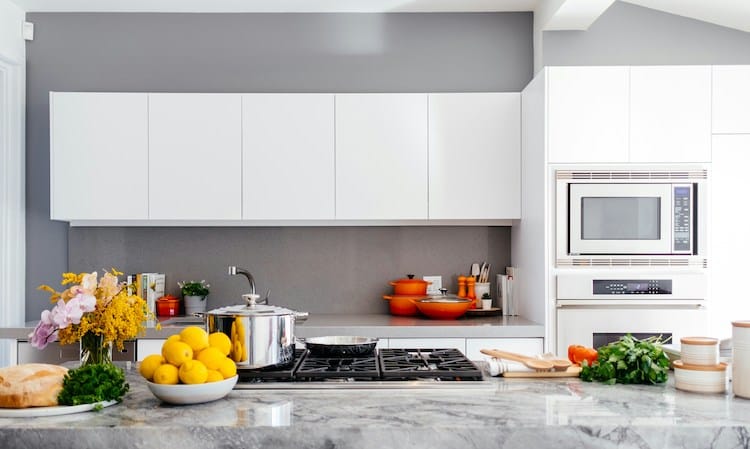
Updated December 2024
When it comes to choosing the perfect countertop material for your kitchen or bathroom, there are a few key differences that could make the decision a lot easier for you. Marble, granite, and quartz are among the most popular building materials for countertops, valued for their durability and style. Granite offers unmatched durability and low maintenance; marble brings timeless elegance but requires care to avoid stains, whereas quartz combines style with ease of maintenance. Many homeowners struggle with the choice between these materials due to their unique benefits. In this post, we’ll explain how you can make your choice of countertop based on budget, lifestyle, and aesthetics, helping you find the perfect material to brighten up your home. Marble is also a popular choice for bathroom vanities, thanks to its elegant appearance and suitability for less demanding environments.
Introduction to Countertop Materials
When it comes to transforming your kitchen or bathroom, the choice of countertop materials can make all the difference in both style and function. Among the most sought-after options are granite countertops, marble countertops, and quartz countertops—each offering its own blend of natural beauty, durability, and practicality. Granite is a natural stone prized for its heat resistance and unique patterns, making it a timeless classic for those who appreciate the look and feel of real stone. Marble, another natural stone, is synonymous with elegance and sophistication, bringing a touch of luxury to any space. For homeowners seeking a low maintenance solution, quartz countertops—an engineered stone—deliver the look of natural stone with enhanced stain resistance and easy care. As you explore these three countertop materials, consider how their distinct qualities can complement your lifestyle and design vision, ensuring your new countertops are both beautiful and functional for years to come.
Durability over Everything
When selecting countertops for your kitchen or bathroom, the material’s endurance is often a top priority—especially as they will be located in busy areas of the home often faced with frequent spills, stains, and scratches. In this situation, granite is a great choice, as it offers resilience without compromising on elegance. Granite, quartz, and marble are the three most popular choices for countertops, each offering unique benefits in terms of durability, style, and maintenance. Granite quartz and marble are often compared for their durability and style in kitchen remodels, helping homeowners make informed decisions based on their needs.
Granite, a natural stone, is renowned for its toughness. It can withstand high temperatures — a hot pan can be placed directly on the surface without causing any damage, making it an ideal choice for kitchens. Furthermore, when properly sealed, granite counters are resistant to stains and bacteria, which is crucial for maintaining hygiene in food preparation and consumption areas. Granite is also scratch resistant, making it ideal for busy kitchens where durability is essential.
The variety of styles and colors available with granite countertops is extensive, ensuring something to suit every taste and kitchen design. From deep, rich blacks and earthy browns to warm golds and cool greys, granite’s natural patterns and colors can complement any decor. Black granite, in particular, is a popular choice for perimeter cabinets or as a striking contrast in two-toned kitchen designs, offering both aesthetic appeal and durability. Each slab offers a unique, one-of-a-kind aesthetic to enhance your kitchen or bathroom.
.
You can maintain granite countertops more easily than other materials. Like most natural stones, they require sealing upon installation, and it is recommended to reseal them every year or two, depending on usage, to maintain their resistant properties. Day-to-day cleaning is simple; just a soft cloth and mild soap are needed to keep them looking pristine.
When selecting countertops for your kitchen or bathroom, the material’s endurance is often a top priority—especially as they will be located in busy areas of the home often faced with frequent spills, stains, and scratches. In addition to material selection, the choice between honed and polished finishes can significantly impact durability and maintenance. Explore the differences between honed and polished countertops here.
The Classic Choice
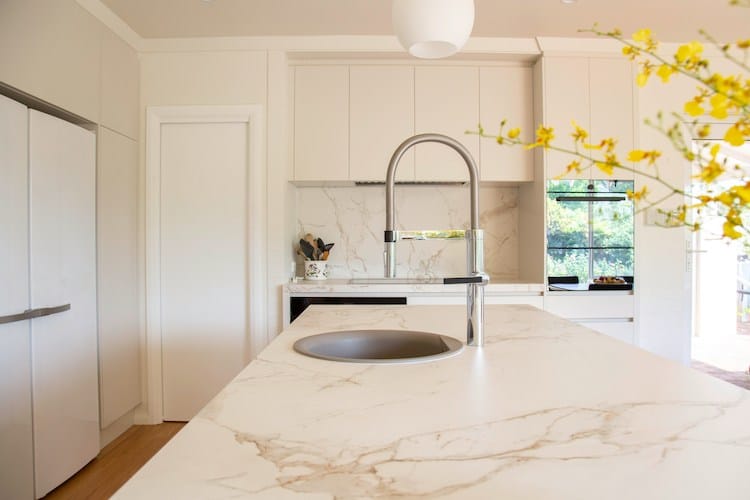
Marble countertops offer a unique, timeless elegance in their design that has secured their place as a popular choice for kitchen and bathroom surfaces for years. Marble is often considered a top choice for elegant countertops in both kitchens and bathrooms, thanks to its sophisticated and luxurious appearance. Here’s a deeper look into the appeal of marble.
Timeless Beauty and Versatility
Marble often conjures up images of luxury and timelessness. Its natural veining and wide spectrum of colors, from stark whites and soft pinks to deep greens and smoky greys, provide an unmatched aesthetic that can elevate the look of any space. The distinct patterns in each slab mean no two marble countertops are exactly alike, offering a unique charm that can complement traditional and modern decor.
Durability with Care
While marble is not as hard as granite, it is still a durable stone that can last decades if cared for properly. It’s essential to understand marble is more porous than some other countertop materials, making it susceptible to staining, especially from acidic substances like wine, lemon juice, and vinegar. However, marble can maintain its pristine appearance for years with regular cleaning and proper sealing.
Maintenance and Upkeep
The key to preserving the beauty of marble is in the maintenance:
Regular sealing: Marble countertops must be sealed upon installation and resealed periodically — typically once a year — to prevent staining and etching. This process can vary based on the marble’s porosity and the level of activity in the kitchen or bathroom.
Immediate cleaning: It’s crucial to wipe up spills as soon as they occur, especially if they are acidic. Regular cleaning should be carried out with a soft cloth and a pH-neutral cleaner to avoid scratching the surface or damaging the sealant.
Avoid abrasive materials: Never use harsh scrubbers or cleaners on marble, as they can scratch the surface or eat away at the sealant, leaving the stone vulnerable to damage.
Low Maintenance Options
If lower maintenance is one of your top priorities for kitchen or bathroom countertops, quartz could be the option for you. Many homeowners choose quartz for its durability, non porous surface, and ease of care, which has contributed to its growing popularity in modern kitchen trends. Quartz countertops are crafted from a blend of crushed quartz and polymer resins, creating a surface that combines the elegance of natural stone with added resilience and durability.
Quartz countertops come in various colors and patterns, some of which mimic the appearance of natural stone, providing the flexibility to match any decor style. Unlike natural stone countertops that require regular sealing, quartz maintains its sheen and resistance without the need for frequent upkeep, making it an ideal selection for those who prefer less maintenance. Quartz does not require regular maintenance like sealing, unlike granite or marble.
The non porous surface of quartz means it’s resistant to staining and bacteria, making it a cleaner and more hygienic surface. Quartz resists stains, making it ideal for busy kitchens. Simple cleaning routines — such as wiping with a soft cloth and mild detergent — are sufficient to keep quartz counters looking pristine.
However, while quartz is resistant to stains and scratches and is inherently stain resistant due to its non porous surface, it is vulnerable to heat. Excessive heat can damage the resin components of the countertop, leading to discoloration and cracks. Unlike granite, quartz is more susceptible to heat damage. So, it’s important to protect your quartz surfaces from direct heat sources by using trivets or heat-resistant mats.
Quartz countertops offer a blend of aesthetic versatility and practicality. They don’t require the same intense maintenance regimes associated with other natural stone surfaces while providing a durable, stylish surface suited to various kitchen and bathroom designs. Quartz is often chosen over traditional solid surface materials for its superior durability and appearance. For those seeking a low-maintenance yet elegant solution, quartz is an excellent choice. If you love the look of marble but want the durability and low maintenance of quartz, quartz marble is a popular option.
Cost and Budgeting
Budget is a key factor when selecting new countertops, and understanding the cost differences between granite, marble, and quartz can help you make a smart investment. Granite countertops typically range from $50 to $150 per square foot, depending on the rarity and quality of the granite slab you choose. Marble countertops, known for their elegant veining, can cost anywhere from $40 to $100 per square foot, with premium varieties commanding higher prices. Quartz countertops, which offer the benefits of engineered stone, generally fall between $45 and $100 per square foot. Beyond the material itself, don’t forget to factor in installation costs, which can add $300 to $500 to your project, as well as any custom features like edge profiles or sink cutouts. For a standard 50 square foot kitchen, you might expect to pay around $3,500 for marble, with granite and quartz coming in at similar or slightly lower price points. By considering both material and labor costs, you can choose the best solution for your space and budget, ensuring your new countertops deliver lasting value.
Countertop Options for Kitchen Islands
A kitchen island is often the centerpiece of a modern kitchen, providing extra workspace, storage, and a gathering spot for family and friends. When selecting a countertop material for your island, it’s important to weigh the same factors as you would for your main kitchen counters—durability, maintenance, and style. Granite is a popular choice for kitchen islands thanks to its heat resistant properties and ability to handle the demands of food prep, including hot pans and cutting boards. Marble brings a sense of timeless beauty and can make your island a true focal point, though it may require more attention to prevent stains and etching. If you’re looking for a low maintenance and durable option, quartz countertops are an excellent pick, as they resist stains and scratches while offering a wide range of colors and patterns. Whether you want a bold granite slab, the elegant veining of marble, or the consistent look of quartz, your kitchen island can be both functional and stunning with the right stone countertop.
Environmental Considerations and Longevity
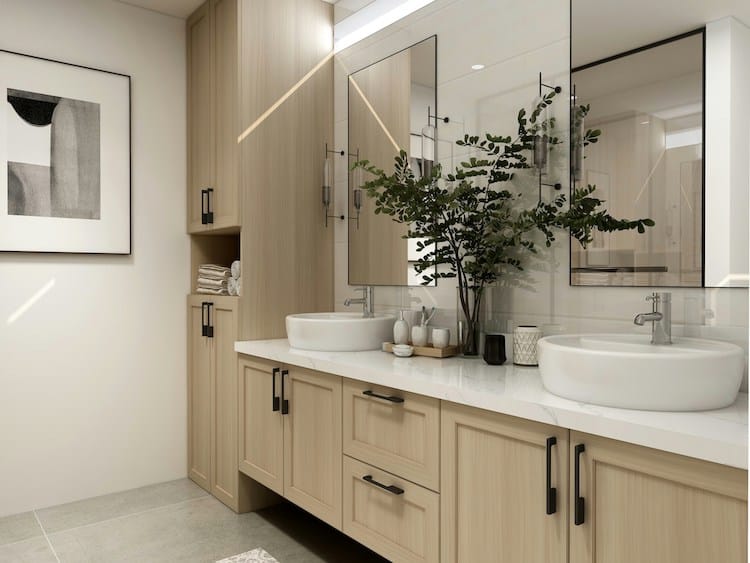
In today’s world, environmental impact and sustainability are increasingly becoming common factors affecting the types of countertops people buy. When choosing between quartz, granite, and marble countertops, it’s helpful to be aware of each material’s ecological footprint and long-term durability. Butcher block is another countertop material option, often chosen for its warm, inviting look and farmhouse style. While butcher block is made from renewable wood sources and can be more sustainable, it generally requires more regular maintenance and may not be as durable as stone surfaces.
Sustainability and Source
Granite and marble are natural stones mined from the earth. The environmental impact of quarrying and transporting these materials can be significant, including habitat destruction and carbon emissions. However, if sourced responsibly as Granite & Marble Solutions’ materials are, natural stone can be a sustainable choice, especially if it comes from local or regional quarries, as this reduces transportation-related carbon emissions.
The type of quartz that is most commonly used in countertops, on the other hand, is an engineered product consisting of natural quartz combined with polymer resins. While its production involves energy-intensive processes, it utilizes abundant materials and can incorporate recycled components, offering a potentially more sustainable option.
Durability and Longevity
Investing in a countertop isn’t just about aesthetics; it’s also about selecting a surface that can withstand years of use. Granite offers fantastic durability and longevity; with proper care, a granite countertop can last a lifetime. Marble, while offering unparalleled beauty, may require more maintenance and can show wear over time, such as etching or staining, particularly if not properly cared for.
Quartz stands out for its durability and low maintenance requirements. It does not require regular sealing like granite and marble, and its non-porous nature makes it resistant to staining and bacteria. However, it’s good to be aware that quartz may not withstand high temperatures as well as granite.
End-of-Life Considerations
Thinking ahead is also essential if considering a countertop surface’s environmental impact. Natural stones like granite and marble can be recycled or repurposed at the end of their lifecycle in your home. For example, old countertops can be cut into tiles or slabs for other projects. Quartz is more challenging to recycle due to its resin content, but its durability makes replacement less frequent.
Long-Term Value and Return on Investment
Investing in high-quality countertops is not just about immediate visual impact—it’s also about enhancing your home’s long-term value. Granite, marble, and quartz countertops are all known to boost resale value, making them attractive choices for homeowners planning a future sale. According to industry reports, quartz countertops can recoup up to 85.7% of their cost, thanks to their low maintenance and modern appeal. Granite and marble countertops also offer strong returns, especially when they are well-maintained and professionally installed. Proper maintenance, such as regular sealing for granite and marble, and routine cleaning for all three materials, helps preserve their beauty and functionality over time. Choosing premium countertop materials and ensuring expert installation can set your home apart in a competitive market, making your kitchen or bathroom remodel a smart investment for years to come. Whether you opt for the classic elegance of marble, the natural durability of granite, or the easy-care benefits of quartz, your new countertops will continue to add value and style to your home.
Making The Choice
Deciding on the right countertop involves more than just picking a material; it’s about weighing up each option’s differences to find the best fit for your home and lifestyle. A kitchen remodel often centers around the selection of kitchen countertops, with granite, quartz, and marble being the top choices for both style and functionality. While we’ve explored options like granite, marble, and quartz, your final decision will likely come down to several key considerations.
In some scenarios Soapstone may be a suitable option. To understand how Soapstone compares to quartz check out this article.
It’s essential to select a countertop that meets your functional and aesthetic needs and aligns with your budget. Costs can vary widely based on the material, design, and installation, so it’s important to evaluate your options carefully. In addition to price, think about how the countertop will be used in your daily life. If you have a busy kitchen, durability and low maintenance might be more important to you. On the other hand, if you’re after a luxury aesthetic, materials like marble might catch your eye despite requiring more upkeep. White quartz is also a popular option for modern kitchen countertops, offering a clean look and excellent durability, making it especially appealing for those seeking stain resistant and elegant countertops.
Remember, choosing a countertop is an important decision that can make or break your kitchen or bathroom design. That’s why our team of experts is dedicated to guiding you through the selection process. We’re here to provide insights on the pros and cons of each material, help you navigate your budget, and ensure you end up with a custom countertop that not only looks great but also effectively serves your needs.
Deciding on the right countertop involves more than just picking a material; it’s about weighing up each option’s differences to find the best fit for your home and lifestyle. If you’re still unsure which countertop is right for you, try our Perfect Fit Countertop Quiz. It’s a quick and easy way to discover the ideal material based on your needs, budget, and design goals. Take the Perfect Fit Countertop Quiz now.
